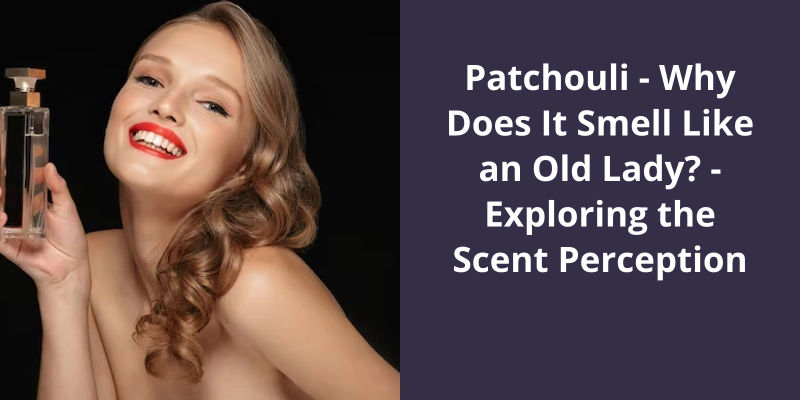Patchouli is a type of aromatic herb, often associated with a strong, heavy scent. Originally from the mint family, its leaves are often used in perfumery and aromatherapy. Patchouli’s scent is described as earthy, sweet, and musky. It gained popularity in the 60s and 70s which has traditionally associated it with older generations, often leading to terms like “old lady smell.” However, in recent years, it’s seen a resurgence in high-end fragrances, a testament to its enduring, distinct scent. Patchouli oil is also known for several potential health benefits such as helping with depression or anxiety, fighting inflammation, and boosting the immune system.

Is Patchouli a Feminine Scent?
Many people believe that patchouli is a purely feminine scent, due to it’s rich, musky aroma that’s often associated with seduction and romance. However, this is far from the truth. Historically, it’s been used as a scent to mask unpleasant smells, such as body odor and musty clothing, and was even used in ancient Egypt to embalm the dead.
Patchouli’s earthy and woody notes make it versatile and appealing to both genders. It blends well with other fragrances and can provide a rugged, natural scent when paired with masculine notes like sandalwood or cedarwood. Patchouli can also be found in a variety of products, such as soaps, lotions, and candles, making it accessible to anyone who enjoys it’s distinctive scent.
What may be perceived as masculine or feminine can vary greatly from person to person. Therefore, if you enjoy the unique fragrance of patchouli, you should wear it proudly regardless of your gender.
It’s been used by both men and women for centuries, and it’s popularity continues to grow.
The History and Cultural Significance of Patchouli in Different Regions of the World
- The origins of patchouli can be traced back to Southeast Asia, particularly in Indonesia and the Philippines.
- It was used by ancient Egyptians for it’s medicinal and aromatherapy properties, and was even used as a form of currency.
- During the 19th century, patchouli became popular in Europe and America as an ingredient in perfumes and personal care products.
- In India, patchouli is used in Ayurvedic medicine and is considered to have a grounding and balancing effect on the mind and body.
- In Japan, patchouli is often used in incense and is associated with spirituality and meditation.
- Today, patchouli can be found in a variety of products from perfumes and candles to soaps and lotions, and it’s distinct earthy scent is beloved by many around the world.
When it comes to finding scents that are similar to patchouli, it’s important to consider the distinct earthy, musky, and woody tones that make it so unique. While there are many scents that share some similarities, a few stand out as particularly reminiscent of patchouli. For example, vetiver is known for it’s sharp and fresh aroma that’s both grassy and root-like, with earthy undertones that make it a great alternative to patchouli.
What Scents Are Similar to Patchouli?
Sandalwood, on the other hand, is a warm and rich scent that’s a woody aroma with spicy undertones. It’s a very similar earthiness to patchouli that makes it a natural complement to the latter. Cedarwood has a similar woody and earthy aroma that’s often used in colognes and perfumes, especially in mens fragrances. It’s a smoky note that gives it a unique character when compared to other woody scents.
Frankincense, another woody and earthy scent, has a resinous and balsamic aroma that’s often used in aromatherapy and perfumery. It’s said to have a calming and meditative effect, which makes it an excellent base note for perfumes and colognes. It’s similarity to patchouli is it’s earthiness and woody aroma, which is often used in combination with patchouli to create unique and complex fragrances.
Other scents that are similar to patchouli include musk, amber, and vanilla. Musk has a slightly pungent aroma that’s often used in masculine fragrances. It’s a strong animalistic note that gives it a distinct character when blended with other scents like patchouli. Amber has a warm and sweet aroma that’s often used in oriental perfumes. Vanilla, on the other hand, has a sweet and creamy aroma that’s often used in gourmand fragrances.
It’s earthy, musky, and woody tones are often used in combination with other scents to create complex and sophisticated fragrances.
How to Blend Patchouli With Other Scents to Create Your Own Unique Fragrance
Patchouli essential oil is a popular scent that can be blended with other oils to create a unique fragrance. You can create your own custom blend by choosing complementary scents such as lavender, vanilla, or bergamot. Simply mix a few drops of patchouli oil with your chosen oils in a carrier oil like jojoba or coconut oil. Experiment with different combinations until you find the perfect scent that matches your personal style.
Conclusion
In conclusion, it’s clear that the association of patchouli scent with an old lady is a subjective and limited view. While some individuals may have formed this connection based on personal experiences or cultural influences, it’s important to recognize the complexities and nuances of scent perceptions. It’s unfair and unwise to dismiss or stereotype this scent based on unfounded assumptions or prejudices. Rather, we should embrace the diversity of scent preferences and appreciate the fascinating ways in which scents shape our experiences and memories.





